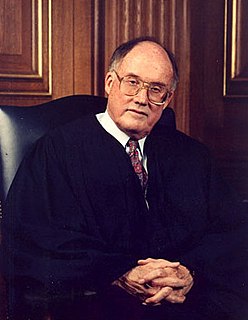A Quote by James Madison
The powers of the federal government are enumerated; it can only operate in certain cases; it has legislative powers on defined and limited objects, beyond which it cannot extend its jurisdiction.
Related Quotes
The powers delegated by the proposed Constitution to the federal government are few and defined. Those which are to remain in the State governments are numerous and indefinite. The former will be exercised principally on external objects, as war, peace, negotiation and foreign commerce. ... The powers reserved to the several States will extend to all the objects which in the ordinary course of affairs, concern the lives and liberties, and properties of the people, and the internal order, improvement and prosperity of the State.
Article I, Section 8, of the Constitution, of course, lays out the delegated, enumerated, and therefore limited powers of Congress. Only through a deliberate misreading of the general welfare and commerce clauses of the Constitution has the federal government been allowed to overreach its authority and extend its tendrils into every corner of civil society.
In the first place, it is to be remembered, that the general government is not to be charged with the whole power of making and administering laws. Its jurisdiction is limited to certain enumerated objects, which concern all the members of the republic, but which are not to be attained by the separate provisions of any.
A constitution, in the American sense of the word, is a written instrument by which the fundamental powers of the government are established, limited, and defined, and by which these powers are distributed among several departments, for their more safe and useful exercise, for the benefit of the body politic.
When the Founders thought of democracy, they saw democracy in the political sphere - a sphere strictly limited by the Constitution's well-defined and enumerated powers given the federal government. Substituting democratic decision making for what should be private decision making is nothing less than tyranny dressed up.
The government will make use of these powers only insofar as they are essential for carrying out vitally necessary measures.... The separate existence of the federal states will not be done away.... The number of cases in which an internal necessity exists for having recourse to such law is in itself a limited one.
The tenth amendment said the federal government is supposed to only have powers that were explicitly given in the Constitution. I think the federal government's gone way beyond that. The Constitution never said that you could have a Federal Reserve that would have $2.8 trillion in assets. We've gotten out of control.




























